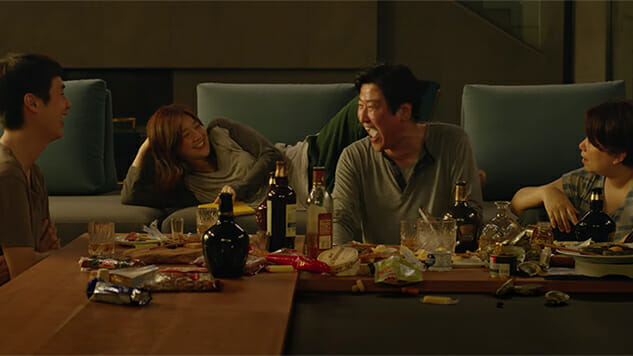Everyone and Everything Is a Performance in Bong Joon-ho’s Absurdist Parasite
Movies Reviews bong joon-ho
“That’s so metaphorical,” exclaims the son of the Kim family, Ki-woo (Choi Woo-shik), holding with childlike reverie a large rock sculpture, a wooden base solidifying its aesthetic and cultural value. The pointedly nice object stands apart from the basic keepsakes in the Kims’ fairly dingy and cramped home, inhabited by unemployed driver father, Ki-taek (Song Kang-ho), unemployed mother, Chung-sook (Jang Hye-jin), and not-in-art-school daughter, Ki-jeong (Park So-dam). Brought to them by Ki-woo’s wealthy friend, the rock is supposed to foretell great financial wealth to whatever family keeps it in their home. Irritated at their own situation, at the lack of space, at the lack of immediate value the rock has, Chung-sook mutters, “Could’ve brought us food.”
In Bong Joon-ho’s Parasite, those that live with a stark awareness of inequality operate with a sense of cognitive dissonance. It’s this paradox of thought that allows Ki-woo to be both naively worshipful towards what a rock sculpture could bring them, but also understand, at other times, that wandering around isn’t how one ascends into power. At the behest of said wealthy friend, he becomes the English tutor for the daughter, Da-hye (Jung Ji-so), of the grotesquely affluent Park family: astute patriarch (Lee Sun-kyun), dim matriarch (Cho Yeo-jeong), manic artsy son, Da-song (Jung Hyun-joon), and severely loyal housekeeper, Moon-gwang (Lee Jung-eun). But as the Kim and Park families grow increasingly closer, both the differences and similarities between them blur beyond discernment.
Bong’s interest in income inequality and class has spanned the majority of his career, examining the ways it impacts the justice system (Memories of Murder, Mother), the environment (Okja) and the institutions responsible for both the exacerbation of wealth inequality and failing to protect those most marginalized by that inequality (Snowpiercer, The Host). For Parasite, Bong takes a slightly different angle—he’s no less interested in inequality’s consequences, but here he sees how class as performance manifests, particularly when people are plucked from one echelon of society and put in another.
The Park home is the stage, with its expansive space, its immaculate floors, its high ceilings and its gargantuan living room window, a screen on which to view their perfect family life. But to look into the Parks’ lives is less an act of voyeurism and more one of invitation. Like every aspect of their affluence, it is affect. Presentational. Though their access to resources is immediate reality, everyone in the Park family, and every object in their home, has a particular role to play. Where the plum extract is kept, where the large table is placed, where the udon noodles are kept, on what wall the photograph of their three dogs is hung: Everything Bong presents deliberately to convey not just how rich the Parks are, but what kind of rich they are. Their home is austere and yet offset by a desperate need to be likable, with the son’s “Basquiat-esque” self-portrait framed amongst other, more traditional family portraits. The housekeeper happily offers food (except peaches) to anyone. Mrs. Park goes out of her way to be accommodating, while balancing a genuine interest in her children’s well-being (bordering on helicopter mom-ing). Mr. Park is very cordial to his new driver. Ki-taek drunkenly admits, “They’re rich, but nice.” Chung-sook, also schnockered, is quick to correct him: “They’re nice because they’re rich.”
The Kim family can be nice, too—with practice. They can learn to assimilate, as best they can for the sake of a steady paycheck (or maybe there’s more to it?), into a culture of privilege and carefree having. They can play that role; they can rehearse being in proximity to wealth, try out pushing the Parks to welcome others like the Kims into their realm while in the garb of those in service to the wealthy, all in the squalor of the Kim kitchen. There they modulate tone and style, gesture and action. As we watch both families act in different, but intersecting, pieces of social/anthropological theatre, Bong cuts through their mutual hunger, and what ultimately and tragically separates them, with a jaundiced eye and an acidic sense of humor. Laughing during Parasite feels like choking on rust. (Cho, especially, finds the perfect amount of absurdity as the somewhat doltish mother, truly a testament to rich ladies being easily knocked over by a feather.) But Bong is not interested in metaphor, and not the kind written on rocks. Even through its absurdist, bleakly satirical lens, Bong understands that social inequity is not just theatre, but lived experience. Sometimes the rock is just a shit-stained rock.
Director: Bong Joon-ho
Writer: Bong Joon-ho, Han Jin-won
Starring: Song Kang-ho, Lee Sun-kyun, Cho Yeo-jeong, Choi Woo-shik, Park So-dam
Release Date: October 11, 2019 (limited)